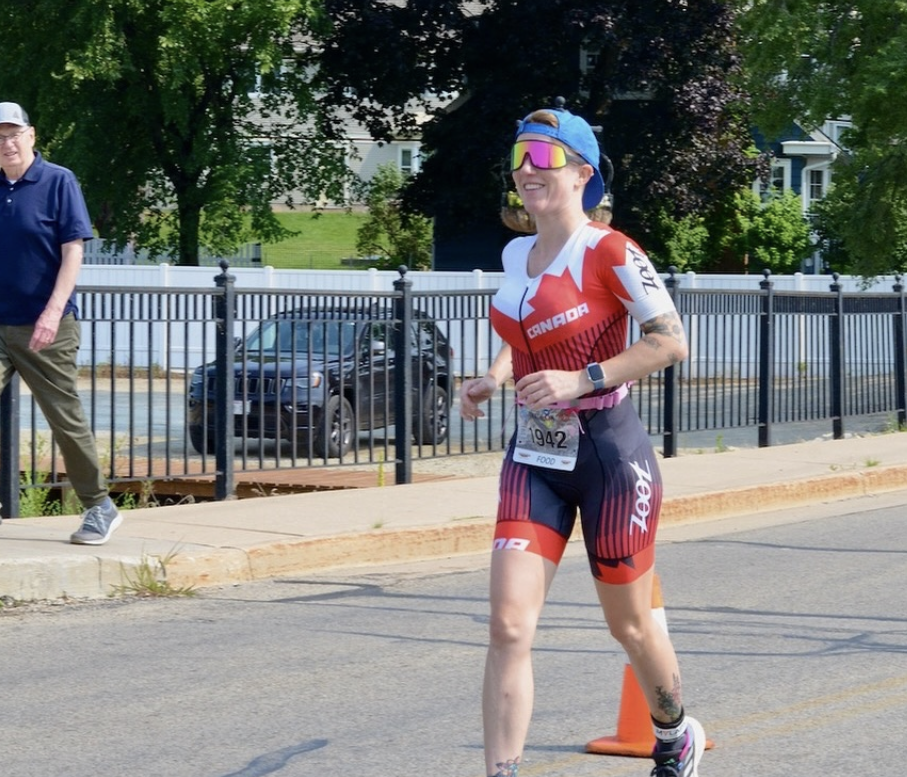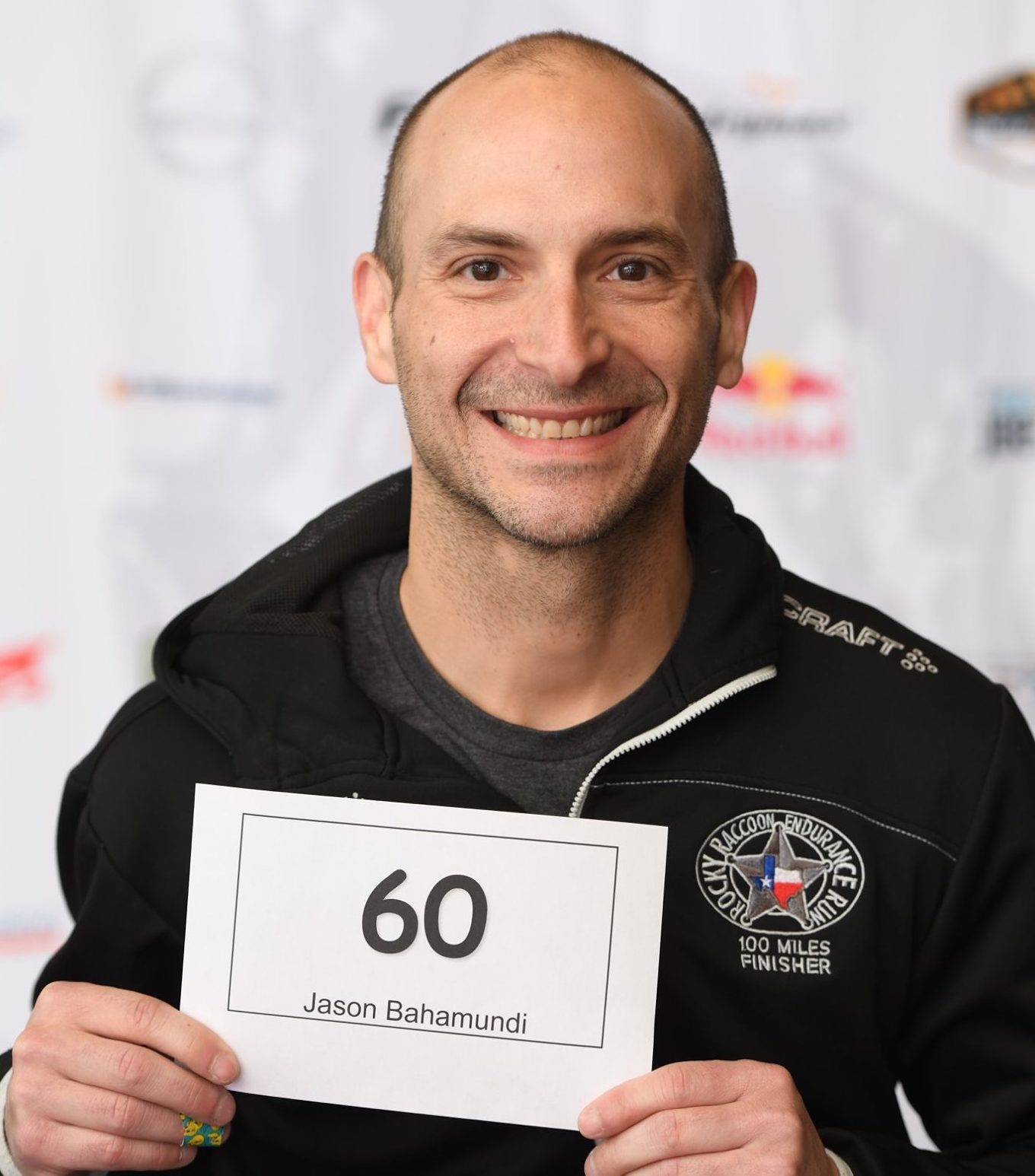Sponsored by
One Woman’s Breast Cancer Diagnosis Led to 70.3 Success

At 31, Meghan McCallum had never run more than a mile. Her athletic background consisted of casual cycling and ultimate frisbee leagues with friends in Milwaukee. The idea of completing a triathlon had never crossed her mind. But sometimes life’s greatest challenges become unexpected doorways to transformation—in Meghan’s case, the challenge was stage 3 breast cancer.
When Meghan discovered a lump during a breast exam in July 2018, doctors initially dismissed her concerns due to her young age. It took nearly six months and multiple misdiagnoses before she received the devastating news: aggressive breast cancer. The delayed diagnosis left her angry and searching for control in an uncontrollable situation.
“I really felt like I needed a target for a lot of my emotions,” Meghan reflects. “Those three doctors who had let me down were circulating in my mind for a long time. I think having something to blame maybe gave me some sense of control.”
Meghan’s story reminds me of the stories that Brandy Ramirez has shared with me. Brandy is a breast cancer survivor whose story involves triathlon and eventually running the swim school for TriDot. There is a lot of inspiration and power in these stories.
Finding Hope Through Team Phoenix
During her year-long treatment of chemotherapy, surgery, and radiation, Meghan began researching post-treatment activities. She needed something to look forward to beyond being a cancer patient. That’s when she discovered Team Phoenix, a 12-week triathlon training program designed specifically for female-identifying cancer survivors in Milwaukee.
“I remember during chemo, doing research about what kind of stuff I can do after all of this,” she explains. “I think I needed something to look forward to because everything had come to a screeching halt.”
The program required no endurance experience – only a cancer diagnosis and willingness to learn. Coaches would teach participants everything needed for swimming, biking, and running, ending with a public sprint triathlon. For someone whose longest run was barely a mile, this seemed both terrifying and exactly what she needed.
But the universe had other plans. Meghan finished treatment in 2019, ready to start her athletic journey in early 2020. Then COVID hit, shutting down programs and leaving immunocompromised individuals like Meghan isolated once again.
When I think about the number of stories I have heard from people about how they got started in triathlon it was never in this scenario. Many people find triathlon after running for a bit or they have a swimming background and want to do more.
The idea of battling cancer and needing something to focus on makes a lot of sense and I hope that those that have gone through cancer treatment or are going through it now can use Meghan as a role model to keep fighting.
ADVERTISEMENT

Learning to Let Go
The forced delay until 2022 became another lesson in releasing control. “That was another reminder about letting go of control,” Meghan notes. “I had become so fixated on 2020 being my year. I was going to do all these things because I really wanted to live my best life now.”
Instead of wallowing, Meghan used the COVID period for deep self-reflection. She confronted what she calls her “recovering perfectionist” tendencies – the need to control every outcome and achieve flawless results. This internal work would prove invaluable in competitive endurance sports.
2020 was a year for a lot of people to self-reflect. It is one of the reasons that Run Tri Bike got started. I had always wanted to start my own business but never took that risk and COVID showed that tomorrow is not guaranteed. Thanks to people like Meghan this business and community is thriving and showing that we can do what we set our minds to.
A Different Kind of Benchmark
When Meghan finally enrolled in Team Phoenix in 2022, she brought a unique perspective shaped by her cancer experience. Her benchmarks were different from typical beginners. She could vividly remember the first time she ran more than four miles – exactly where it happened and who she was with.
“My benchmarks might be different because I can very easily remember the first time I ran more than four miles,” she shares. “That’s still a pretty clear memory in my mind.”
June 11th marked the six-year anniversary of her double mastectomy surgery – what she calls her “lowest of the low day.” From being bedridden and barely able to walk around the block, she had built up to biking two miles, then much more. Every distance now feels remarkable compared to that starting point.
Her training philosophy reflects hard-won wisdom about perfectionism. Rather than obsessing over perfect workout completion, Meghan focuses on progress. Her mantra became “progress over perfection” – serving her both in training and life.
I think about perspective…..a lot! Where I am today is much further down the road than where I started. Instead of forgetting that starting point, I have to remind myself of the progress. The comparison game is real but when I compare myself to my past self….I am winning!
Conquering Her Weakest Link
Swimming presented Meghan’s biggest challenge. Having never done swim training before Team Phoenix, she could barely complete the sprint distance during her first triathlon. Instead of being discouraged, she saw an opportunity for growth.
She joined master swim workouts and connected with an open water swimming group meeting at Lake Michigan at 6 AM. Gradually, stroke by stroke, she built capacity. One personal benchmark was consistently swimming a mile in open water – something that still amazes her.
“I continue to think – this is incredible. I cannot believe I’m even saying that I just did that,” she remembers.
ADVERTISEMENT

Building Through Community
The Team Phoenix program introduced Meghan to more than triathlon techniques – it provided community. Unlike her cancer treatment experience, where she felt isolated as the youngest in her friend group to face serious illness, Team Phoenix surrounded her with women who understood her journey.
“During cancer treatment, I felt isolated due to my young age,” Meghan explains. “Some people stepped up unexpectedly while others didn’t know how to provide the support I needed.”
In triathlon, she found people who valued the journey as much as the destination. The sport became more than individual achievement. It became a connection with others who understood rebuilding after trauma.
Community can often be an often overused word but I cannot emphasize enough that finding people who support you and push you toward your goals and dreams is invaluable. You don’t have to be a part of everything but you want to be a part of the thing that wants to be a part of you.
70.3 Success
Meghan’s progression from sprint triathlon to half Iron (70.3 miles) represents more than athletic achievement. The finish lines, in training and on race day, demonstrate how endurance sports help us redefine what’s possible. Her first 70.3 took place in Victoria, British Columbia, with another scheduled at the same location in July.
“So far my longest is a 70.3,” she says proudly. “I think for me, what’s healthiest mentally is to not jump ahead to this other distance that’s literally double what my current maximum is.”
This measured approach reflects wisdom gained through her cancer journey. Rather than rushing toward the next challenge, she’s savoring current capabilities while continuing to build. She’s acquired a tri bike and seen significant swimming improvements, setting herself up for a better time in her second Victoria half.
Sharing Her Story
Meghan is happy to share her story with anyone who will listen. “I’m just an ordinary person who went through this experience and was at some pretty low lows both physically and mentally,” she explains. “Here’s an example of a way I was able to turn things around.”
Her advice for beginners is refreshingly practical: don’t be afraid to ask questions, identify as a beginner for as long as needed, and lean on community support. She emphasizes the remarkable experience of learning new skills as an adult and watching your brain and body adapt.
Life Lessons Beyond the Finish Line
Meghan’s story illustrates how endurance sports serve as powerful catalysts for personal growth extending far beyond race day. The lessons about letting go of perfectionism, accepting what cannot be controlled, and finding strength in community have applications everywhere.
The physical challenges of triathlon training pale compared to fighting for her life. This perspective allows her to approach training with joy rather than anxiety, viewing each workout as celebration of what her body can do.
Today, as Meghan prepares for her second Victoria half, she carries lessons learned through trauma, recovery, and athletic achievement. Her story of going from cancer survivor to finishing a 70.3 triathlon demonstrates that our greatest challenges often contain seeds of our most meaningful growth.
For anyone facing challenges, Meghan’s story offers hope and practical wisdom: start where you are, use what you have, do what you can. Find your community, ask for help, and remember that progress over perfection isn’t just a training philosophy. This is a life philosophy that can carry you through any distance.
ADVERTISEMENT








